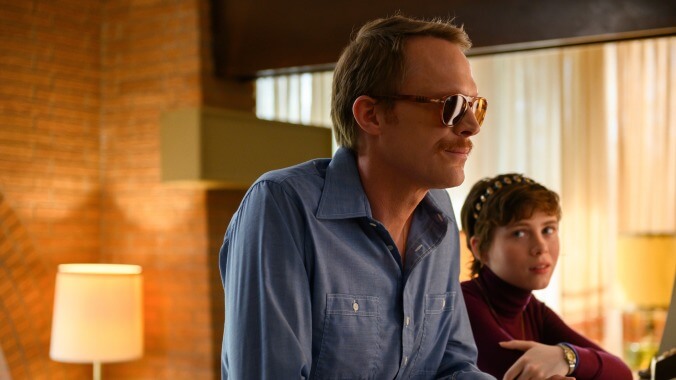Alan Ball’s Uncle Frank smothers a great performance with lazy condescension


There are two movies at war with each other inside Uncle Frank. In the first, Frank (Paul Bettany), a celebrated literature professor at New York University, crumples before the tombstone of a long-lost loved one. He lifts a desperate palm to the stone’s face and covers part of the name there, turning “Samuel” into the more intimate “Sam.” Grief pushes him into the dirt even as his self-loathing unmoors him from the island he’s built for himself; he’s somehow dragged downward and set adrift at once. But then the second movie asserts itself. Frank’s young niece, Beth (Sophia Lillis), enters the frame and tosses a perfect little theme nugget at his feet like she’s dropping a gas station bouquet at a graveside. Like magic, that intricate web of rage and regret vanishes. The sun shines. The bees buzz. Frank smiles and sighs, for all’s well that ends well. And as for homophobia—well, let’s put it the way one of the characters does: “No problem.”
Writer-director Alan Ball has said that Uncle Frank is not autobiographical, similarities between Frank’s background and his own be damned. That’s easier to believe than it might otherwise be, thanks to the maddening flimsiness and condescension of that aforementioned second movie. It’s saccharine, lazy, and self-satisfied. Still, it might not seem so utterly divorced from reality were it not for the rich character study it subsumes. Uncle Frank anchors itself to the war within Frank, but it’s the conflict within the film itself that’s most potent. That’s a fight no one wins, least of all the audience.
Most of the actors emerge unscathed. We meet Frank as he pays a rare visit to his family in rural South Carolina in the early 1970s. It’s an occasion witnessed through the curious, almost adoring eyes of Sophia, who hangs on her uncle’s every word. She soon follows in his footsteps, leaving her mother and father (Judy Greer and Steve Zahn), grandparents (Margo Martindale and Stephen Root), and a slew of other family members to set off for NYU. When she pays an impromptu visit to Frank’s apartment, she meets his “roommate,” Walid (Peter Macdissi, Ball’s longtime partner and a frequent collaborator), and becomes one of the precious few in his family to whom Frank has come out. One big step follows another, as Frank receives a phone call that his father has died, and the pair pile into his car for a funereal road trip. The baggage is abundant.
Luckily, such abundance also means loads of dramatic fodder, the kind even a mediocre actor could run with. Bettany is not mediocre. He turns in a performance both delicate and furious; in his hands, Frank is the china shop and the bull. He’s so good that Uncle Frank’s failures—its flimsiest and most insincere moments—look all the more frustrating. In a pivotal scene, Frank endures an unfathomable cruelty, and Bettany’s wordless performance is visceral and immediate. But he’s nearly as good in the passages of warmth and joy Ball allows his protagonist, and for much of the first half of the film, his gentle scenes with Lillis and Macdissi (both also excellent) make it all too easy to overlook the occasional hints of something shallow and even smug beneath the surface.
Once the road trip reaches its endpoint, however, the relationship between Beth and Frank fades into the background, as questions of individuality, honesty, and the cost of living out in the open give way to needless and repetitive melodrama. (Uncle Frank can have a little substance abuse storyline, as a treat.) It’s also the point at which the film loses interest in subtlety. Early in the proceedings, the supporting players, while not particularly well-developed, at least draw out the themes of inherited hatred and the chasm that can exist between goodness and good intentions. Not so in the second half, when things blow up and the infuriatingly lazy conclusion trots near. If nothing else, any film that rounds up Greer, Martindale, Root, and Lois Smith and then gives them almost nothing to do has made a wrong turn somewhere.
At least it looks good. Ball’s staging is often stilted, particularly once the party arrives back in South Carolina —there’s a scene in which one can practically feel how badly Martindale wants to get out of her armchair and do some real acting. But with the help of cinematographer Khalid Mohtaseb and composer Nathan Barr, Ball manages to conjure a hell of a lot of atmosphere. The New York sun plays differently than the light in South Carolina; somehow the Southern air feels different, too.
It’s simple stuff but effective, perfectly in keeping with the coming-of-age energy that defines the film’s opening acts. Easy doesn’t always mean lazy. But Uncle Frank’s bewilderingly pat conclusion all but obliterates the good that comes before, reducing the complexity of Frank’s experience to those two words, “No problem.” It’s Zahn’s character who lets them rip. While it’s tempting to read it as a summary of the film’s failings, what actually lingers is a line from one of the better-served characters: “Nice always hides something. What’s hidden is what’s interesting.”